Exploring Unique Alternatives to Eco Bags for Sustainable Living
 As the movement towards sustainable living gains momentum, eco bags have often been heralded as a staple in the quest for environmentally friendly solutions.
However, while eco bags are a popular choice for reducing plastic waste, there are numerous unique alternatives that can further enhance our efforts in sustainable living.
This blog will explore ten innovative substitutes that not only serve the purpose of carrying goods but also prioritize sustainability in their design and usage.
By shedding light on these alternatives, we aim to inspire readers to think beyond the conventional eco bags and discover creative ways to reduce their ecological footprint.
Join us as we delve into the reasons why integrating these unique options into our daily lives can lead to a more sustainable future.
As the movement towards sustainable living gains momentum, eco bags have often been heralded as a staple in the quest for environmentally friendly solutions.
However, while eco bags are a popular choice for reducing plastic waste, there are numerous unique alternatives that can further enhance our efforts in sustainable living.
This blog will explore ten innovative substitutes that not only serve the purpose of carrying goods but also prioritize sustainability in their design and usage.
By shedding light on these alternatives, we aim to inspire readers to think beyond the conventional eco bags and discover creative ways to reduce their ecological footprint.
Join us as we delve into the reasons why integrating these unique options into our daily lives can lead to a more sustainable future.
Table of Contents
[Hide]
Innovative Reusables: Beyond the Traditional Eco Bag
In recent years, the shift towards sustainable living has inspired innovative reusables that extend beyond traditional eco bags. As the world grapples with plastic pollution, industries are looking for ways to reduce their carbon footprint while promoting circular economies. This includes not only using reusable shopping bags but also exploring alternatives such as beeswax wraps, silicone food storage bags, and compostable containers. These products are not only functional but also help cultivate a more eco-conscious lifestyle by minimizing waste.
Interestingly, various sectors are enhancing their sustainability initiatives, particularly in delivery and packaging. With growing concerns over environmental impact, businesses are upgrading to greener logistics and recycling strategies. For instance, many companies are now adopting sustainable packaging materials and implementing take-back programs for used products. This not only reduces pollution but also aligns with evolving consumer preferences for eco-friendly options. As the demand for innovative reusables continues to rise, the focus on sustainability will undoubtedly expand, paving the way for more unique alternatives to traditional eco bags.
Disposables Redefined: Biodegradable Options for Everyday Use
The rise of environmental awareness has led to a surge in the demand for biodegradable options that can replace traditional disposable products. According to a report by MarketsandMarkets, the global biodegradable plastics market is expected to reach $15.2 billion by 2027, growing at a CAGR of 14.5% from 2022. This shift is largely driven by increasing regulations on single-use plastics and a consumer preference for sustainable alternatives. Biodegradable products, ranging from cutlery and plates to bags and packaging, are being redefined to offer convenience without compromising environmental integrity.
One notable example is the use of plant-based materials such as cornstarch and sugarcane in manufacturing disposable items. Research by the European Bioplastics Association indicates that by 2025, biodegradable materials could account for 20% of the global plastic market. These innovations not only provide a viable substitute for conventional disposables but also ensure that products break down naturally within a short period after disposal, reducing the burden on landfills. As consumers become more environmentally conscious, integrating these biodegradable alternatives into our daily lives presents a promising avenue for sustainable living, transforming how we think about disposables.
Exploring Unique Alternatives to Eco Bags for Sustainable Living
Crafting Your Own: DIY Alternatives to Store-Bought Eco Bags
When it comes to embracing sustainable living, crafting your own alternatives to store-bought eco bags can be a
fulfilling and environmentally-friendly choice. DIY eco bags not only reduce reliance on plastic but also allow for personal expression through creativity.
From upcycled materials like old T-shirts and jeans to natural fibers such as jute or cotton, the materials you choose can reflect your style and commitment to sustainability.
One popular DIY option is to transform an old T-shirt into a reusable shopping bag.
Simply cut off the sleeves and neckline, and tie the bottom in a knot for a quick and easy solution. This not only keeps textiles out of landfills but also gives
a second life to clothing that might otherwise go unused. Additionally, using fabric scraps to sew small pouch bags is a great way to store produce, toiletries, or other items,
all while minimizing waste. Exploring these creative projects can enhance your sustainable lifestyle while showcasing your individuality and resourcefulness.
Function Meets Fashion: Stylish Sustainable Solutions for Carrying
In recent years, the quest for sustainable living has spurred the search for innovative alternatives to traditional eco bags. While reusable bags are a staple, the growing interest in stylish options highlights a blend of fashion and functionality that appeals to environmentally conscious consumers. From chic totes made of recycled materials to multifunctional backpacks designed for both urban days and nature outings, there’s a spectrum of stylish choices that cater to diverse lifestyles.
One standout option is the use of biodegradable or compostable materials in bag design. These eco-friendly bags maintain a fashionable look while ensuring a reduced environmental impact. Companies are also experimenting with artistic prints and bold colors, transforming the mundane act of carrying bags into an opportunity for personal expression. Moreover, hybrid designs that incorporate elements of crossbody bags or chic clutches not only enhance convenience but also allow consumers to make a bold fashion statement, ultimately proving that one can adhere to sustainable principles without sacrificing style.
Exploring Unique Alternatives to Eco Bags for Sustainable Living
| Alternative | Material | Functionality | Fashion Element | Environmental Impact |
|---|---|---|---|---|
| Jute Tote Bags | Jute Fiber | Durable, reusable | Earthy tones & patterns | Biodegradable and renewable |
| Canvas Drawstring Bags | Cotton Canvas | Lightweight, packable | Customizable designs | Sustainable sourcing of cotton |
| Bamboo Fiber Bags | Bamboo Fiber | Water-resistant, soft | Natural aesthetic | Rapidly renewable resource |
| Recycled PET Bags | Recycled Plastic Bottles | Sturdy, weather-proof | Modern and sleek designs | Reduces plastic waste |
| Hemp Market Bags | Hemp Fiber | Strong, antibacterial | Vintage look | Low environmental footprint |
Natural Materials: Exploring the Benefits of Organic and Upcycled Textiles
In the quest for sustainable living, the choice of materials plays a critical role. Organic and upcycled textiles have emerged as compelling alternatives to traditional eco bags. According to a report by the Global Organic Textile Standard (GOTS), organic cotton uses 88% less water compared to conventional cotton, which is essential in reducing our overall environmental impact. Upcycled materials also provide a practical solution, as they divert waste from landfills, with estimates indicating that upcycling can reduce carbon emissions by up to 70% compared to producing new items.
When selecting eco bags, consider opting for those made from organic textiles, such as hemp or bamboo, which are biodegradable and require fewer resources. For an even more sustainable choice, look for products made from upcycled materials. This not only supports a circular economy but also often results in unique and stylish designs.
**Tips:** Always check for certifications like GOTS or OEKO-TEX when purchasing organic bags to ensure high environmental and social standards. Additionally, try to choose multi-use bags that can serve varied purposes—this reduces the need for multiple purchases and further decreases your ecological footprint.
Related Posts
-

How to Choose the Perfect Eco Bags for Your Sustainable Lifestyle
-
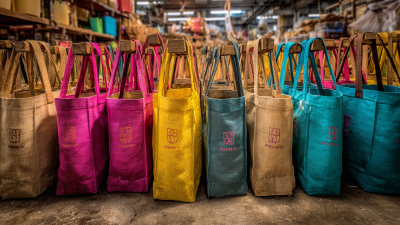
Discover Unmatched Quality of Eco Bags from China Leading Factories Trusted by Global Buyers
-
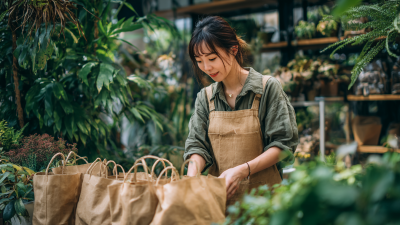
How to Choose the Best Sustainable Bags for Your Business: An Expert's Guide to Eco-Friendly Solutions
-
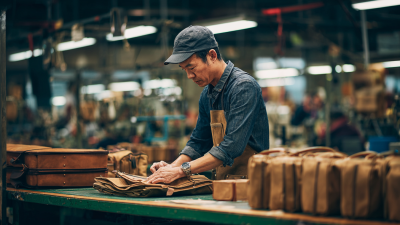
Discovering the Unmatched Quality Specifications of the Best Bag Manufacturer for Global Buyers
-
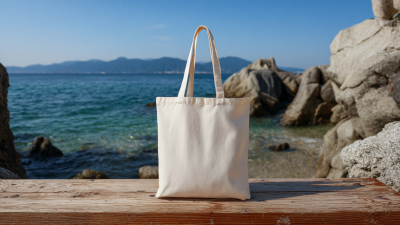
Top Strategies for Choosing the Best Eco Tote Bag for Your Everyday Needs
-
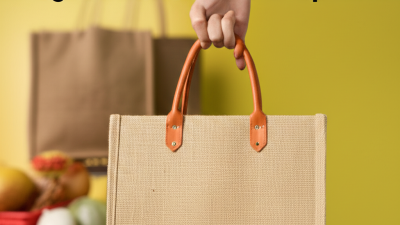
Future Trends in Best Burlap Tote Market by 2025 with Key Insights and Practical Tips

We are the most reliable and proficient jute goods manufacturer & supplier that helps businesses or individuals with various exportable agricultural commodities biz and jute goods by shipping them worldwide. Our right-time service ensures that whatever color and size of jute product you need, we can make it happen anytime and anywhere! Let’s keep our earth safer to live in!
Important link
Address
Bangladesh Address:
Fair Plaza (9th Floor), Plot : 3C, Section : 01, Mirpur, Dhaka:1216
UK Office:
242 Manor Road, Droylsden, Manchester, M43 6JD, United Kingdom.
Let's Talk

We are the most reliable and proficient jute goods manufacturer & supplier that helps businesses or individuals with various exportable agricultural commodities biz and jute goods by shipping them worldwide. Our right-time service ensures that whatever color and size of jute product you need, we can make it happen anytime and anywhere! Let’s keep our earth safer to live in!
Get Started
Let's Talk
Address
Bangladesh Address:
Fair Plaza (9th Floor), Plot : 3C, Section : 01, Mirpur, Dhaka:1216
UK Office:
242 Manor Road, Droylsden, Manchester, M43 6JD, United Kingdom.